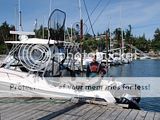2muchdraft
Member
With this recent storm and listening to the posts of others... I can't help but think I need more training on what to do if something goes wrong - really wrong out there.
I've taken the power squadron course but still don't think I have the hands on training/knowledge of what to do in rough weather or if a catastrophe happens.
Does anyone know of courses for general public that would help with this sort of thing? I'm talking - pulling someone out of the water, what to do in the water. How to handle unexpected waves, big seas.
It's not that I ever put myself in that position intentionally but does anyone ever plan for that.
I've taken the power squadron course but still don't think I have the hands on training/knowledge of what to do in rough weather or if a catastrophe happens.
Does anyone know of courses for general public that would help with this sort of thing? I'm talking - pulling someone out of the water, what to do in the water. How to handle unexpected waves, big seas.
It's not that I ever put myself in that position intentionally but does anyone ever plan for that.


